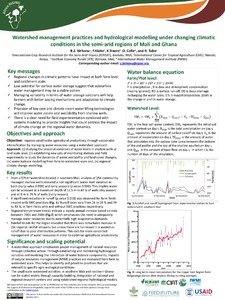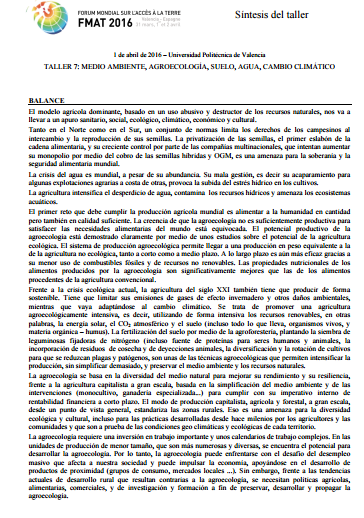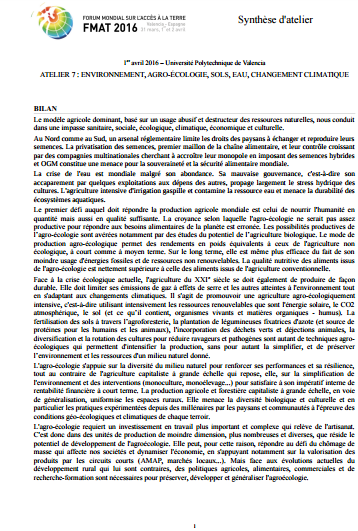Validação de parâmetros operacionais para o manejo de mesas de subirrigação
RESUMO A subirrigação requer que a definição do manejo hídrico e nutricional seja adequada ao equipamento e à cultura a ser cultivada para obter elevada eficiência de irrigação em comparação a outros sistemas.
WORKSHOP 7: ENVIRONMENT, AGRO-ECOLOGY, SOIL, WATER, CLIMATE CHANGE
The dominant agricultural model, based on the abusive and destructive use of natural resources, leads us into a health, social, ecological, climatic, economic and cultural impasse.
TALLER 7: MEDIO AMBIENTE, AGROECOLOGÍA, SUELO, AGUA, CAMBIO CLIMÁTICO
El modelo agrícola dominante, basado en un uso abusivo y destructor de los recursos naturales, nos va a llevar a un apuro sanitario, social, ecológico, climático, económico y cultural.
ATELIER 7 : ENVIRONNEMENT, AGRO-ÉCOLOGIE, SOLS, EAU, CHANGEMENT CLIMATIQUE
Le modèle agricole dominant, basé sur un usage abusif et destructeur des ressources naturelles, nous conduit dans une impasse sanitaire, sociale, écologique, climatique, économique et culturelle.
Reducing conflicts around water points
SOLIDARITES INTERNATIONAL works in the region of Kidal, in northern Mali, since 2015 to improve agro-pastoral activities through the implementation of WaSH activities.
Permanent research plots in Bengkalis, Riau: Carbon dynamics and water regimes of re-wetted peatlands
In collaboration with the University of Riau, the Center for International Forestry Research (CIFOR) has established permanent plots in Tanjung Leban village, Bengkalis regency, Riau province. The site, which is owned by the local community, is about 50 km east of the city of Dumai and easily accessed by car.
2016 Global Food Policy Report
The Global Food Policy Report is IFPRI’s flagship publication. This year’s annual report examines major food policy issues, global and regional developments, and commitments made in 2015, and presents data on key food policy indicators. The report also proposes key policy options for 2016 and beyond to achieve the Sustainable Development Goals.
2016 Global Food Policy Report: Synopsis [in Russian]
Для международного сообщества 2015 год стал поворотным моментом. Окончание срока выполнения Целей развития тысячелетия подчеркнуло поразительные успехи, достигнутые с 1990 года: доля людей, живущих в крайней нищете, уровень детской смертности и масштабы голода сократились почти вдвое. Однако по-прежнему остаются огромные проблемы.
Rapport 2016 sur les politiques alimentaires mondiales: Synopsis
L’année 2015 a marqué un tournant décisif pour la communauté internationale du développement. L’aboutissement des Objectifs du Millénaire pour le développement a souligné les avancées remarquables enregistrées depuis 1990 : l’extrême pauvreté, la mortalité infantile et la faim ont toutes chuté à peu près de moitié. Toutefois, un défi considérable demeure.
Food policy in 2015-2016: Reshaping the global food system for sustainable development
The year 2015 saw a new global commitment to sustainable development that will require a reshaping of the world’s food system. The well-being of people and the planet will depend on creation of a food system that is more efficient, inclusive, climate-smart, sustainable, nutrition- and health-driven, and business-friendly.
2016 Global Food Policy Report: Synopsis
The Global Food Policy Report is IFPRI’s flagship publication. This year’s annual report examines major food policy issues, global and regional developments, and commitments made in 2015, and presents data on key food policy indicators. The report also proposes key policy options for 2016 and beyond to achieve the Sustainable Development Goals.











